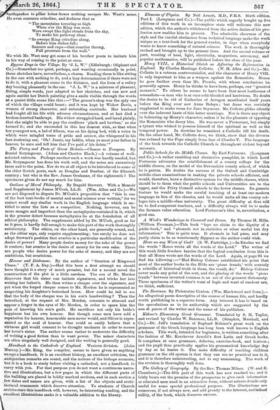Honour and Dishonour. By the author of " Stretton of
Ringwood Chace." (T. F. A. Day.)—Had this been a first attempt we should have thought it a story of much promise, but for a second novel the 'construction of the plot is a little careless. The son of Mr. Morden *discovers that his sister can imitate signatures, and tricks her into writing her father's. He then writes a cheque over the signature, and yet when the forged cheque comes to Mr. Morden he is represented as suspecting his daughter's betrothed lover. How could he fail to see that the body of the cheque was in his son's handwriting ? Then the betrothed, at the request of Mrs. Morden, consents to abscond and appear a forger in the eyes of Mr. Morden, in order to spare him the pain of knowing his son's guilt. He sacrifices not only his bride's happiness but his own honour. But though some men have sold a reputation for honour, honourable men never would, and Oliver is repre- sented as the soul of honour. One could as easily believe that a virtuous girl would consent to be thought unchaste in order to screen her lover's sister. The author seems rather to underrate the difficulty of writing a good fiction than to want power. The minor characters are often singularly well designed, and the writing is generally good.






























 Previous page
Previous page